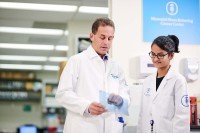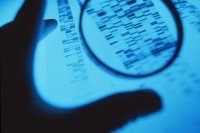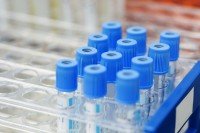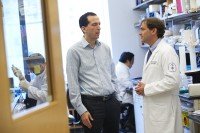In the Lab

How Do Inherited Gene Mutations Cause Cancer? A New Database Will Help Researchers Find Out
In a new paper, a collaborative team of MSK experts reports how a novel tool will help researchers learn more about the role of inherited hereditary mutations.
Feature

How MSK-ACCESS Blood Test for Cancer was Created
MSK-ACCESS, a blood test that can detect mutations in 129 genes related to cancer, has already helped guide the treatment of more than 2,800 patients at MSK.
Finding

Machine Learning May Help Classify Cancers of Unknown Primary
MSK investigators report a new tool that may help them determine the origin of some metastatic tumors, potentially leading to better targeted treatments.
Finding

Whether a BRCA Mutation Leads to Cancer Depends on Context, Study Finds
Sometimes a BRCA mutation is just along for the ride, rather than driving a tumor’s development.
MSK-ACCESS Receives New York State Approval for New Molecular Assay
Memorial Sloan Kettering Cancer Center (MSK) today announced that the New York State Department of Health has issued approval for a new molecular assay, Analysis of Circulating cfDNA to Evaluate Somatic Status (MSK-ACCESS). MSK-ACCESS was developed within the Marie-Josee and Henry R. Kravis Center for Molecular Oncology (CMO) and the test has been clinically validated and implemented by members of MSK’s Molecular Diagnostics Service.
Finding

Gene Mutations in the Blood Can Complicate Findings from Tumor Sequencing
A blood condition related to aging can lead to misinterpreting tumor data.
In the Clinic

MSK Opens New Clinic to Monitor People with a Genetic Risk for Developing Blood Cancer
MSK's new clinic will focus on clonal hematopoiesis, a condition related to aging that increases the risk of developing certain blood cancers.
Announcement

FDA Authorizes MSK-IMPACT Test for Analyzing Patient Tumors
The test, developed at MSK, looks for alterations in 468 genes that are seen in both common and rare cancers.
MSK-IMPACT™ Is the First Tumor-Profiling Multiplex Panel Authorized by the FDA, Setting a New Pathway to Market for Future Oncopanels
The US Food and Drug Administration (FDA) announced today the authorization of MSK-IMPACT™ (which stands for integrated mutation profiling of actionable cancer targets), a high throughput, targeted-DNA-sequencing panel for somatic mutations. Created by the Department of Pathology at Memorial Sloan Kettering Cancer Center (MSK), MSK-IMPACT is a 468-gene oncopanel intended to detect gene mutations and other critical genetic aberrations in both rare and common cancers.
Finding

Secondary Leukemia: Research Suggests New Ways to Understand What Causes This Side Effect of Cancer Treatment
MSK investigators find that the presence of certain gene mutations in patients’ blood may mean they are more likely to get a secondary leukemia.
Landmark Analysis from Memorial Sloan Kettering Reveals Genomic Tumor Sequence of More Than 10,000 Cancer Patients Using MSK-IMPACT™
Memorial Sloan Kettering (MSK) has reached a major milestone in bringing personalized treatments to more cancer patients. Michael Berger, PhD, Ahmet Zehir, PhD, and colleagues have reported an in-depth analysis of the first 10,336 patients whose tumors were submitted for clinical genomic sequencing by MSK-IMPACT™, a powerful diagnostic test developed at MSK to provide detailed genetic information about a patient’s cancer.
Finding

Study Reveals How Some Breast Cancers Become Resistant to Targeted Drugs
A study of one patient’s disease has clarified why tumors stop responding to a class of experimental drugs called PI3K inhibitors.
Profile

At Work: Physician-Scientist David Solit
David Solit, Director of the Marie-Josée and Henry R. Kravis Center for Molecular Oncology, discusses how working with cancer patients drives him to develop more-effective, personalized cancer treatments.
Announcement

Bold Initiative to Transform Cancer Care Established with a $100 Million Gift
With the creation of the Marie-Josée and Henry R. Kravis Center for Molecular Oncology, Memorial Sloan Kettering sets out to deliver on the promise of personalized medicine by creating better treatment options for all people with cancer.











